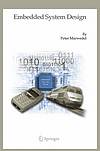| Course | Lecture Notes | Exam Policy | Problem Sets | Solutions |
Embedded Systems
Bernd Finkbeiner, Room 506, Building E 1 3, office hours Wednesdays 15-16
Rüdiger Ehlers, Michael Gerke, Hans-Jörg Peter, Room 532, Building E 1 3
Time and place
Lectures: Tue, Thu 14:15-15:45, E1 3, Hörsaal 002
Tutorials:
Mon, 16:00-18:00, E1 3, SR015
Wed, 14:00-16:00, E2 4, SR5 (215)
News
- The exam inspection for the backup exam will take place on Monday, 20th of April, 16:15 in E1 3, room 528. If you are unable to attend due to conflicting lectures, please drop us an e-mail to arrange an individual inspection appointment.
- Backup exam results and final grades are now online.
- Updated final exam results are now online.
- The exam inspection and a tutorial will take place on Monday, 16th March, at 16:15 in E1 3, HS01.
- The admission list to the exam is now available (link).
- There will be no tutorials in the week starting on the 9th of February. The solutions to the last problem sheet will be given in the lecture on the 10th. From Monday to Wednesday, the tutors will be in their offices (at least) during the usual tutorial times (Mon, 16-18, Wed. 14-16 and additionally Tuesday after the lecture) to answer questions.
- Slides from the guest lecture by Werner Damm are available now (pdf).
- A note on problem set 7: The third problem has been updated due to the missing number of processors.
- Guest lecture on January 8, 2009: Werner Damm, Carl von Ossietzky University Oldenburg: Key Trends in Automotive System Development
The lecture starts by highlighting key concepts of the Autosar approach to automotive developments. It then identifies additional needs to adress both real-time and safety aspects, and proposes solutions based on the Rich Components approach currently developed in the integrated project Speeds.
- Tutorials will start again on the 12th of January, so there are no tutorials from the 5th to the 9th of January!
- Midterm results are now online: You can use the same login as for the example solutions.
- Exam policy: The exams will be open book, i.e., bring any handwritten or printed notes, or any books you like.
- Exam registration: Please make sure you are registered for the exam. Registration through HISPOS is open from November 17 to December 5. If you cannot register through HISPOS, send email to Bernd Finkbeiner. In case of technical problems with HISPOS, contact René König.
- Notes to problem set 3:
Exercise 1: If you want to use your own model from problem set 2, make sure that it works correctly! Otherwise you are strongly encouraged to use the given template. Again, you are asked to incrementally extend your model, i.e. your final model must subsume both subproblems. Furthermore, make sure that your model fulfills at least the scenarios that are depicted on the problem set.
Exercise 3: Please note that the definitions of satisfiable and valid coincide here, since we are considering closed universally quantified DNF formulae.
- Email address: For questions and file submissions, please use the following email address: es08@react.cs.uni-sb.de.
- Exam policy: To ensure consistency with the module description, we have modified the exam policy. It is now possible to participate in both the end-of-term and the end-of semester exams. The best grade counts.
- Meeting times for the tutorial: We’ve created a doodle poll with possible tutorial times: please help us find tutorial times that fit your schedule by indicating your preferences.
- Matlab tutorial: Prof. Matthias Hein offers a Matlab Tutorial on October 15, 2008. The tutorial gives background on Matlab that is useful for participants in the lecture courses Embedded Systems, Machine Learning, and Telecommunications. (Participation is recommended but not mandatory.)
Syllabus
Embedded systems are computer systems that are encapsulated into larger products, and that are normally not directly visible to the user. Embedded systems are responsible for the information processing in transportation systems (e.g., airplanes, trains, cars), telecommunication equipment (e.g., mobile phones), and consumer electronics products (e.g., TVs, DVD-players).
In this course we will study the theoretical foundations and practical tools that are needed to build reliable and efficient embedded systems.
Topics
- Specification: review of the most commonly used languages employed in the specfication of embedded systems (e.g., StateCharts, Petri nets, and VHDL);
- Embedded hardware: sensors, communication units, processing units, memories, and actuators;
- Embedded software: embedded operating systems, scheduling algorithms;
- Hardware/software codesign: methods for the optimal division of labor between the hardware and software parts of an embedded system;
- Validation: methods for ensuring that an embedded system behaves as expected: simulation, testing, formal verification.
Main textbook
| Peter Marwedel. Embedded System Design. Springer, Berlin; 2nd Print (1. November 2005) ISBN-10: 0387292373 |
 |